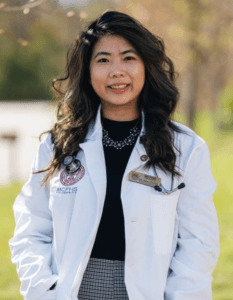Belinda Felicia recently began her dream job as a physician associate in the surgical department at Lawrence + Memorial Hospital in New London, Conn. As a surgeon’s second hand, she assists in all aspects of surgery,
She began preparing for her medical career at Great Bay Community College, where Felicia completed the Medical Assistant Training Program in summer 2018 with the intent of eventually becoming a physician associate. She enrolled in Great Bay’s 12-week program after earning her bachelor’s in neuroscience from UNH in spring 2018.
“When I got my degree at UNH, I knew I wanted to go to PA school, but I wanted to find a way to get clinical hours to become a better PA. Becoming a medical assistant helped with all of that and has made me a better PA. It was a perfect way to prepare me for what I am doing now,” she said.
As part of her externship with Great Bay, Felicia worked as a medical assistant with Core Physicians. She continued working there after she received her MA certificate. In 2020, she enrolled in the two-year Master of Physician Assistant Studies at Massachusetts College of Pharmacy and Health Sciences in Manchester, one of two universities in New Hampshire that offers a PA degree. The other is Franklin Pierce University.
And now, she’s doing exactly what she envisioned when she enrolled at Great Bay.
Physician associates – also sometimes referred to as physician assistants – are licensed clinicians who practice medicine in nearly every primary care and medical field. Highly trained, PAs work directly with doctors and provide medical treatment themselves, including conducting patient exams, diagnosing illnesses, writing prescriptions, creating and managing treatment plans, and other duties. In some parts of the country, and especially in rural areas, PAs provide care for entire communities.
Before they can gain acceptance into most universities that offers PA training, prospective students must amass 1,000 patient-care hours. Great Bay’s 12-week Medical Assistant Training Program allows students to begin accumulating those hours quickly, creating a pathway to a university-degree program and a career in the field. With its accelerated structure and built-in externship opportunities, the MA program provides valuable pre-PA training, said Bruce Vance, Program Manager for Great Bay’s Healthcare Programs.
“Belinda’s story is a powerful example of how in only five years a person can become a high-level medical provider and realize their goals,” Vance said. “Our 12-week Medical Assistant program played a key role in her educational journey. It proved to be a fast, convenient, and cost-effective way to bridge her undergraduate accomplishments with her post-graduate work.”
Medical assistants work alongside physicians, often in medical offices or clinics. They are cross trained to perform administrative and clinical duties, including taking medical histories, explaining treatments and procedures, assisting physicians during exams, collecting and preparing lab samples, as well as welcoming patients, updating medical records, and coding and filling out insurance forms.
Great Bay’s next Medical Assistant Training Program begins Jan. 16. The college will host virtual information sessions about the program on November 7th at 10:30AM & 7:00PM, November 8th at 12:00PM and on November 9th at 2:00PM. More information on how to register for the event is available at https://www.greatbay.edu/ma
Many former Great Bay students now working as licensed PAs or studying to become one benefitted from Great Bay’s medical assistant training program as a springboard. Molly Hanlon graduated from Great Bay’s MA program in 2021 and is now enrolled in her first of two years of PA school at Bay Path University in Longmeadow, Mass. She thought she might pursue her interest in medical school but opted to become a physician associate instead.
For her, Great Bay provided her best way forward toward achieving her goals.
“I went to Great Bay because I knew I could get the direct patient-care hours I needed to get into PA school,” she said. “I wanted to get those hours as quickly as possible so I could get started with PA school as quickly as possible, and the Great Bay program allowed me to do that. The program was awesome – lots of hands-on practice, talking with patients, talking with providers.”
Current Great Bay student Alyssa Milliken enrolled in the MA program with similar goals. “I needed something that was fast and could get me into the field as quickly as possible,” said Milliken, who lives in Rochester. “Great Bay’s program is 12 weeks and allows me to start accumulating patient-care hours quickly.”
She will work as a medical assistant in general surgery at Wentworth-Douglass Hospital before applying for PA school. She appreciates the diverse experiences that Great Bay has provided her, because they have helped her prepare for many career options. “I have been given pediatric medicine experience, surgery experience, emergency medicine experience, medical lab experience, and many more. It’s truly an all-around great way to start a medical career,” she said. “It’s a rigorous program.”
Meghan Galante of Dover also plans to attend PA school after becoming a certified medical assistant. She expects to work as a medical assistant for two years before applying to PA school.
“It’s perfect preparation for becoming a PA,” she said. “I purposefully chose Great Bay with the intention of going to PA school because of the patient-care hour requirements I would obtain after I receive my MA certificate. I would recommend the Great Bay training to others because of the convenience, the professors, and the fact that they are able to place you in an externship to prepare you for working as an MA and getting those patient-care hours.”
Vanessa DiRissi wishes she had enrolled at Great Bay. She is a senior pre-PA student at a large northern New England university, who plans to apply for entry to a PA school in the spring. To accumulate the clinical hours necessary to apply, DiRissi works as a phlebotomist at Southern Maine Healthcare in Biddeford in addition to taking classes.
“I love what I do, and phlebotomy is a good skill to have. But if I had to do it over, I would have become a medical assistant and gotten my patient-care hours that way. I think medical assisting is the best way a pre-PA student can get exposed to the medical field,” DiRissi said. “I wish I had that opportunity.”


